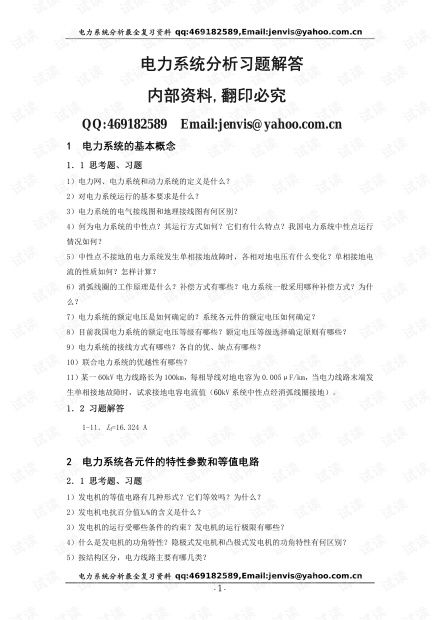
电力系统分析英文,Introduction to Power System Analysis
时间:2024-10-07 来源:网络 人气:
Introduction to Power System Analysis

Power system analysis is a critical field within electrical engineering that focuses on the study and design of power systems. It involves the examination of the behavior, performance, and stability of electrical power systems under various operating conditions. This article aims to provide an overview of power system analysis, its importance, and some key concepts and techniques used in this field.
Importance of Power System Analysis

Power system analysis is essential for ensuring the reliable and efficient operation of electrical power systems. It helps engineers and operators to understand the behavior of power systems, predict potential issues, and design solutions to enhance system performance. Some of the key reasons why power system analysis is important include:
Ensuring system stability and reliability
Optimizing power generation and distribution
Minimizing system losses
Improving power quality
Designing and planning for future system expansion
Key Concepts in Power System Analysis

Several key concepts are fundamental to power system analysis:
Power Flow Analysis: This involves determining the distribution of electrical power within a power system, including the voltages and currents at various points in the system. Power flow analysis is crucial for understanding the system's behavior and for planning and operating the system efficiently.
Stability Analysis: Stability analysis focuses on the ability of a power system to maintain its operational state in the presence of disturbances. This includes transient stability, which examines the system's response to sudden changes, and voltage stability, which assesses the system's ability to maintain acceptable voltage levels.
Power Quality Analysis: Power quality analysis involves assessing the quality of electrical power supplied to consumers. This includes factors such as voltage fluctuations, harmonic distortion, and frequency variations, which can affect the performance of electrical equipment.
Techniques Used in Power System Analysis

Several techniques are employed in power system analysis to study and design power systems:
Optimization Techniques: Optimization techniques are used to find the best operating conditions for power systems. This includes optimizing power generation, transmission, and distribution to minimize costs and maximize efficiency.
Applications of Power System Analysis

Power system analysis has numerous applications in the electrical power industry:
Power System Planning: Power system analysis is used to plan the expansion and development of power systems, ensuring that they can meet future demand while maintaining reliability and efficiency.
Power System Operation: Operators use power system analysis to monitor and control the operation of power systems, ensuring that they operate within safe and efficient limits.
Power System Protection: Power system analysis helps in designing and implementing protective schemes to safeguard power systems from faults and disturbances.
Renewable Energy Integration: With the increasing integration of renewable energy sources into power systems, power system analysis is essential for ensuring the stability and reliability of these systems.
Conclusion

Power system analysis is a vital component of electrical engineering, providing insights into the behavior and performance of power systems. By employing various techniques and tools, engineers can design, operate, and protect power systems to ensure their reliability, efficiency, and sustainability. As the demand for electricity continues to grow, the importance of power system analysis will only increase, making it a crucial field for the future of the electrical power industry.
相关推荐
教程资讯
教程资讯排行
- 1 vivo安卓系统更换鸿蒙系统,兼容性挑战与注意事项
- 2 安卓系统车机密码是多少,7890、123456等密码详解
- 3 能够结交日本人的软件,盘点热门软件助你跨越国界交流
- 4 oppo刷原生安卓系统,解锁、备份与操作步骤详解
- 5 psp系统升级620,PSP系统升级至6.20官方系统的详细教程
- 6 显卡驱动无法找到兼容的图形硬件,显卡驱动安装时出现“此图形驱动程序无法找到兼容的图形硬件”怎么办?
- 7 国外收音机软件 app,国外收音机软件APP推荐
- 8 Suica安卓系统,便捷交通支付新体验
- 9 dell进不了bios系统,Dell电脑无法进入BIOS系统的常见原因及解决方法
- 10 能玩gta5的云游戏平台,畅享游戏新体验











